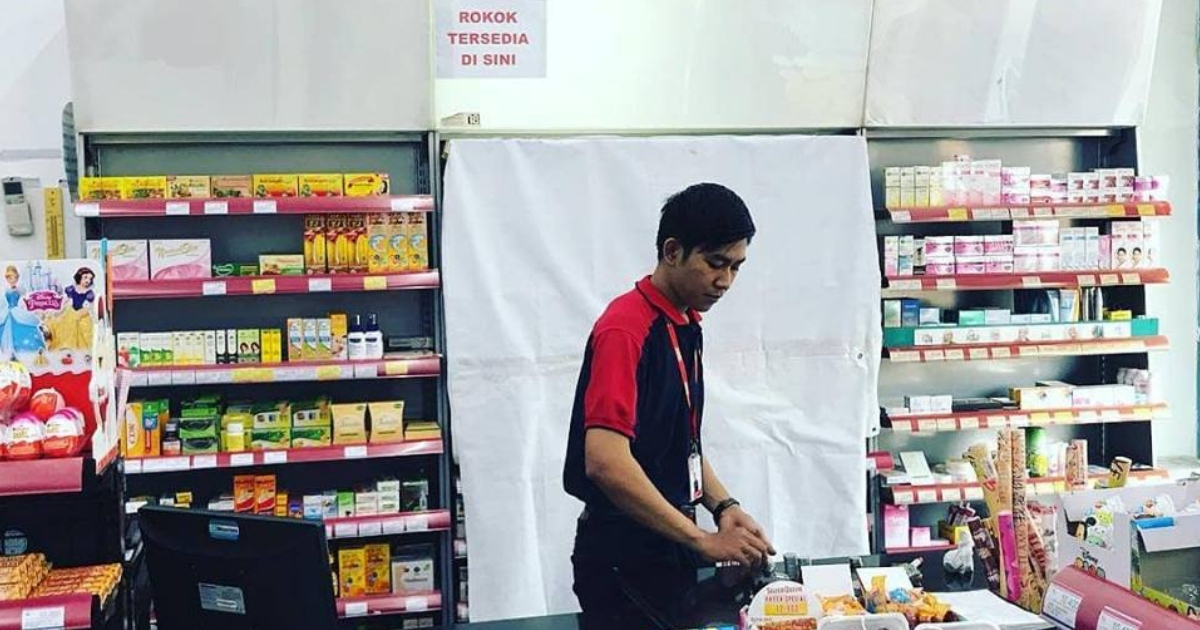One of the (many) reasons why Indonesia has such infamously high smoking rates is that cigarettes are so incredibly visible and available here — it’s hard to walk more than 100 meters in many Indonesian cities without seeing cigarettes on display somewhere. But two of Jakarta’s satellite cities are trying a tactic that has been used successfully in other countries to decrease demand by curtaining off cigarettes from consumers at convenience stores.
The West Java cities of Depok and Bogor, both just outside of Jakarta, recently passed regulations requiring minimarkets to place curtains in front of the cigarette stands that are always found prominently displayed behind their cashiers.
The regulations did not receive much fanfare when they were enacted. Bogor’s regulation actually came into effect in December but was based on an earlier 2009 regulation banning cigarette advertising in certain public spaces.
Depok’s cigarette curtaining rule came into effect one month ago, also as part of newly passed regulations on cigarette advertising passed by the local government.
“Yes, they are curtained off because of the regulation of the Depok Government. About a month ago there was a circular about this policy. It requires (the curtains) to be installed,” an Alfamart employee named Indira told Detik today.
Indira said that minimarkets that did not comply with the regulation would face sanctions from the authorities.
Are the policies effective? Two minimarket employees that Detik talked to said that the curtains in their stores had been somewhat successful in decreasing demand, especially among young customers (children under 17 are not legally allowed to buy cigarettes in Indonesia, but the country’s disturbingly high underage smoking rates shows how ineffective that is).
On the other hand, employees of an Alfamaret in Bogor told Kumparan that the curtain had not really affected their cigarette sales. Most but not all stores still had some signage indicating that cigarettes could still be purchased there.
Similar regulations requiring tobacco products to be hidden from display have been passed in cities such as New York and countries including England (where studies have shown it was especially effective in decreasing the number of underage smokers purchasing from stores).
The effects of Indonesia’s infamously high smoking rates have been well documented, with around 67.4 percent of all men over 15 in Indonesia being tobacco users (the highest rate in the world) and tobacco-related diseases killing at least 200,000 Indonesians per year. The government has shown little willingness to combat the country’s smoking epidemic, failing to pass national laws banning tobacco advertising and refusing to ratify the World Health Organization Framework Convention on Tobacco Control.
In fact, the House of Parliament in 2017 tried to pass a tobacco bill aimed at rolling back regulations, including those on advertisement as well as health warnings on cigarette packs.
Luckily, that bill never passed into law, but the national government’s unwillingness to pass tobacco controls means that local regulations such as those in Depok and Bogor are the only thing preventing another generation of Indonesian children from being bombarded with tobacco advertising and turned into young smokers. One study in 2016 found that around 30% of all Indonesian children have smoked a cigarette before the age of 10 (one of those, of course, being Indonesia’s infamous smoking baby).





Reader Interactions